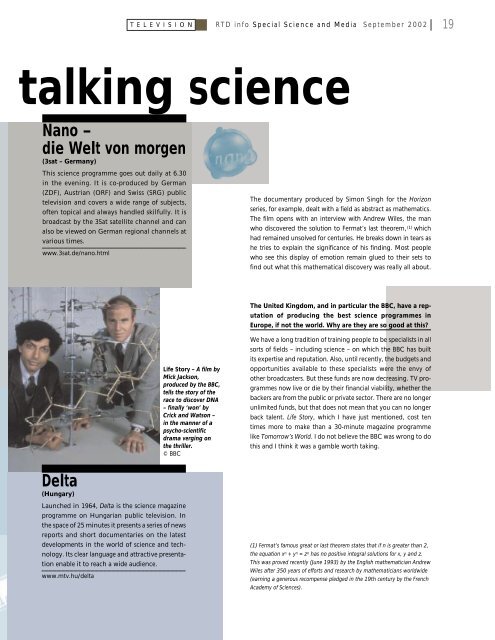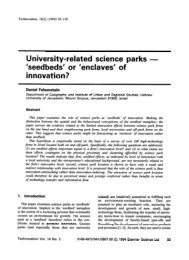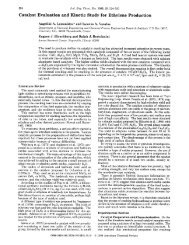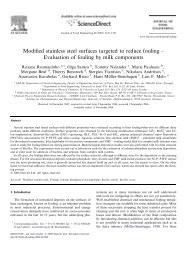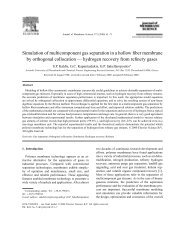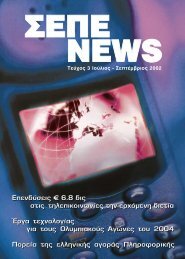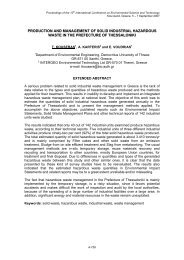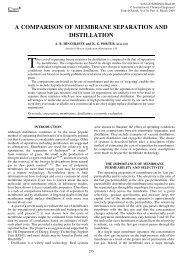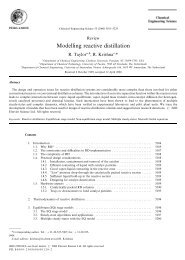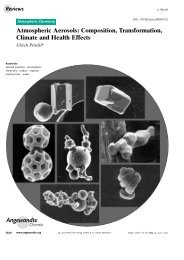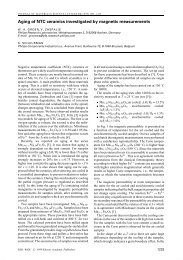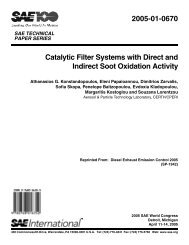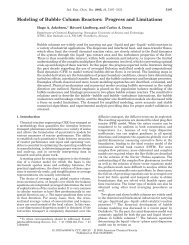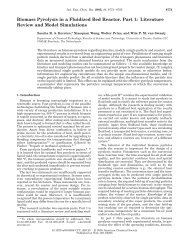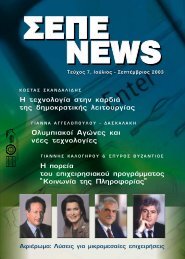RTD info - European Commission - Europa
RTD info - European Commission - Europa
RTD info - European Commission - Europa
Create successful ePaper yourself
Turn your PDF publications into a flip-book with our unique Google optimized e-Paper software.
T E L E V I S I O N <strong>RTD</strong> <strong>info</strong> Special Science and Media September 2002<br />
19<br />
talking science<br />
Nano –<br />
die Welt von morgen<br />
(3sat – Germany)<br />
This science programme goes out daily at 6.30<br />
in the evening. It is co-produced by German<br />
(ZDF), Austrian (ORF) and Swiss (SRG) public<br />
television and covers a wide range of subjects,<br />
often topical and always handled skilfully. It is<br />
broadcast by the 3Sat satellite channel and can<br />
also be viewed on German regional channels at<br />
various times.<br />
www.3sat.de/nano.html<br />
The documentary produced by Simon Singh for the Horizon<br />
series, for example, dealt with a field as abstract as mathematics.<br />
The film opens with an interview with Andrew Wiles, the man<br />
who discovered the solution to Fermat’s last theorem, (1) which<br />
had remained unsolved for centuries. He breaks down in tears as<br />
he tries to explain the significance of his finding. Most people<br />
who see this display of emotion remain glued to their sets to<br />
find out what this mathematical discovery was really all about.<br />
The United Kingdom, and in particular the BBC, have a reputation<br />
of producing the best science programmes in<br />
Europe, if not the world. Why are they are so good at this?<br />
Life Story – A film by<br />
Mick Jackson,<br />
produced by the BBC,<br />
tells the story of the<br />
race to discover DNA<br />
– finally ‘won’ by<br />
Crick and Watson –<br />
in the manner of a<br />
psycho-scientific<br />
drama verging on<br />
the thriller.<br />
© BBC<br />
We have a long tradition of training people to be specialists in all<br />
sorts of fields – including science – on which the BBC has built<br />
its expertise and reputation. Also, until recently, the budgets and<br />
opportunities available to these specialists were the envy of<br />
other broadcasters. But these funds are now decreasing. TV programmes<br />
now live or die by their financial viability, whether the<br />
backers are from the public or private sector. There are no longer<br />
unlimited funds, but that does not mean that you can no longer<br />
back talent. Life Story, which I have just mentioned, cost ten<br />
times more to make than a 30-minute magazine programme<br />
like Tomorrow’s World. I do not believe the BBC was wrong to do<br />
this and I think it was a gamble worth taking.<br />
Delta<br />
(Hungary)<br />
Launched in 1964, Delta is the science magazine<br />
programme on Hungarian public television. In<br />
the space of 25 minutes it presents a series of news<br />
reports and short documentaries on the latest<br />
developments in the world of science and technology.<br />
Its clear language and attractive presentation<br />
enable it to reach a wide audience.<br />
www.mtv.hu/delta<br />
(1) Fermat’s famous great or last theorem states that if n is greater than 2,<br />
the equation x n + y n = z n has no positive integral solutions for x, y and z.<br />
This was proved recently (June 1993) by the English mathematician Andrew<br />
Wiles after 350 years of efforts and research by mathematicians worldwide<br />
(earning a generous recompense pledged in the 19th century by the French<br />
Academy of Sciences).


